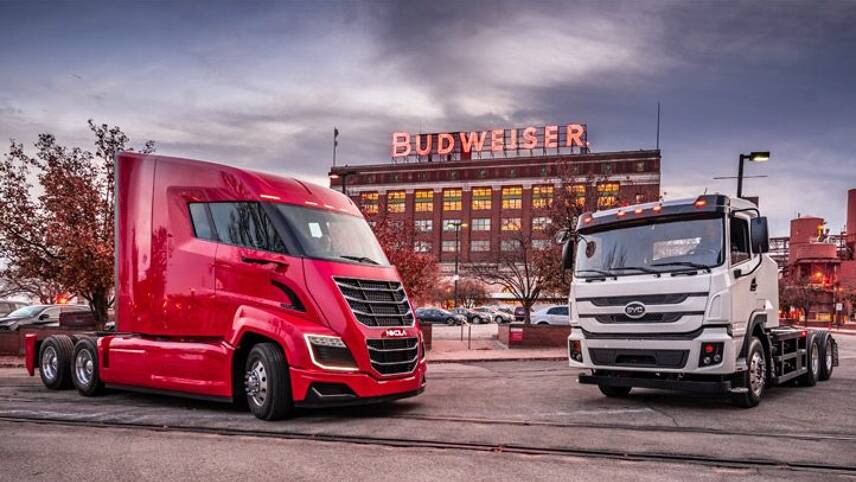Register for free and continue reading
Join our growing army of changemakers and get unlimited access to our premium content

Pictured: The two vehicles used to make the delivery
The brewer, which owns brands including Budweiser, Stella Artois and Beck’s, completed the milestone delivery on Thursday (21 November) in St. Louis, Missouri.
On the day, Bud Light was picked up by a Nikola hydrogen-electric truck from the local Anheuser-Busch brewery and taken to AB InBev’s local wholesale partner Lohr Distributors. Lohr Distributors then used a fully-electric truck, manufactured by BYD, to deliver the beer to the iconic sports and concert venue.
Nikola Motor Company claims the AB InBev delivery marked the first time one of its hydrogen-electric semi-tucks has been used to make a commercial journey.
AB InBev first placed its order with Nikola in May 2018, requesting 800 hydrogen-electric semi-trucks. The vehicles will be integrated into its fleet from early 2020, as the brewer strives to run its entire fleet of long-haul trucks on clean energy by 2025.
“At AB InBev, we are continuously searching for innovative ways to improve sustainability across our entire value chain, progressing towards reaching our sustainability goals and driving our industry forward,” AB InBev’s vice president of procurement and sustainability Ingrid De Ryck said.
“No single company can build a more sustainable future alone, but this zero-emission delivery has shown what is possible when we bring together the various strengths and assets within our supplier network to work towards a shared objective of a better world.”
The road so far
Elsewhere in its fleet strategy, AB InBev is exploring the possibilities of automation and other digital technologies to improve efficiency. It used an autonomous truck to deliver 50,000 cases of Budweiser across a 120-mile route in Colorado and, in 2017, submitted an order for 40 Tesla plug-in semi-trucks.
In its UK operations specifically, AB InBev recently began trialling liquefied natural gas (LNG) as truck fuel.
As for Nikola Motor Company, it is expected that the hydrogen-electric semi will compete for a market share with Tesla’s all-electric semi-truck. Tesla’s model was slated for 2019 production, but timelines have been pushed back owing to delays associated with the ‘Cybertruck’ and other vehicles.
Going forward, Nikola is planning to start selling an autonomous, hydrogen-powered lorry across several European markets in 2023.
Sarah George


How is the hydrogen produced? Is it by electrolysis of water or from methane gas, if the later then the delivery is in no way zero emission.